Paperwork Needed for Heavy Haul in Texas
Heavy haul applies to shipments which exceed the legal height, weight, or length limits that the local government has set. In this case, we’ll be talking about paperwork needed to comply with hauling limits in Texas.
With any hauling job, it’s essential to make sure you have all the proper permits and paperwork before starting. Choosing the right hauling carrier can help ensure you meet all the requirements and don’t end up having to pay exorbitant amounts of money for not knowing or following the regulations.
With all the restrictions in the trucking industry, along with finding special equipment and permits, it can be confusing to know where to start. In this guide, we’ll answer the most important questions related to heavy haul in Texas and give you a brief overview of each permit offered by the Texas Department of Motor Vehicles.
What are the size and weight limits for hauls in Texas?
The maximum limits for any load in Texas—without requiring any extra permits or paperwork—are 14’ in height, 8’6” in width, and 59’ in length. However, you also have to be careful of weight limits because even if your load does not exceed the size limits, it may be too heavy and require a heavy haul permit anyways. The weight limit in Texas is 20,000 lbs. for single axle, 34,000 lbs. for dual axle, or 80,000 lbs. total. Before applying for any permit, you must verify the size and weight of your load.
Are there any extra precautions that come with hauling oversized loads?
There are absolutely extra restrictions and precautions that you need to be aware of before hauling an oversized load. First and foremost, you must know if your load is oversized and where your starting point and destination is so that you can apply for the proper permit.
Some additional precautions to keep in mind are that your load may need to be escorted at a certain time of day/night. Escorts are heavily regulated to ensure the safety of everyone and can include flashing lights, warning signs, and/or colored flags.
It’s also important to be aware of restrictions on hazardous materials, bridges, load-zoned roads, country and district permits, and structures with low vertical clearance. More information on each can be found on the Texas DMV’s website under “Roadway Information.”
How should I prepare to apply for an oversized load permit?
The most important way to prepare is by recording your haul’s starting point and destination, size, and weight. You must also be a registered operating authority, which means you must comply with the Texas Motor Carrier Registration (MCR), Unified Carrier Registration (UCR), or Permit Surety Bond.
While these are the most essential pieces of information to know before applying for a permit, there may be additional details, fees, and restrictions required depending on which type of permit you apply for and which route you’ll be taking.
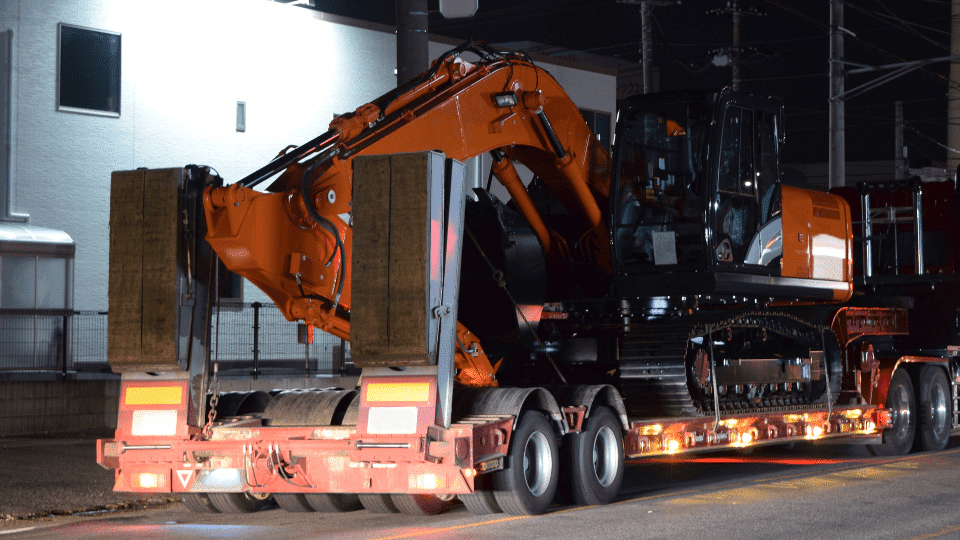
What kinds of permits are available?
1. General Single-Trip
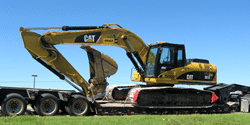
General Single-Trip Permits are issued for non-divisible vehicles exceeding the size and weight limits up to 254,300 lbs. These permits apply for only one movement from a specific starting point to a specific destination, during a specific time of day. You must also have a Route Inspection Certification on file before receiving the permit.
2. Manufactured Housing Single-Trip
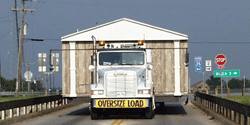
Manufactured Housing Single-Trip Permits are a special type of General Single-Trip Permits which allow you to transport manufactured housing as well as industrialized buildings and housing. Like other single-trip permits, there must be only one movement from a specific starting point to a specific destination. An extra detail to note is that these types of permits are only valid for five days.
3. Portable Building

If you’re looking to transport portable buildings and their cargo, you’ll want a Portable Building Permit. Like the two previous permits, this type is also for a single trip.
4. Super Heavy
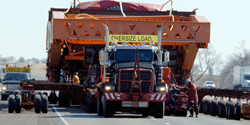
Super Heavy Single-Trip Permits are used for non-divisible loads which have a gross weight exceeding 254,300 lbs.—or 200,000 lbs. with less than 95 feet of axle spacing. For this permit, there are additional steps and restrictions to follow, such as filling out the Certification Regarding Agreement to Transport Super Heavy Load(s) form and a loading diagram. Each of these are described in more detail on the Texas DMV’s website.
5. House Move

Another type of single-trip permit, House Move Permits allow you to transport houses over 20 feet wide from a certain starting point to a certain destination. The Texas DMV provides suggested routes for house moves, and a representative of your company must inspect the proposed route before the move to ensure safety and efficiency.
6. Intermodal Shipping Container Port

To haul cargo within 30 miles of Texas port authorities or ports of entry, you’ll need an Intermodal Shipping Container Port Permit. This permit is valid for one year and follows specific guidelines and measurements that can be found on the DMV’s website.
7. Crane & Well Service Unit Mileage
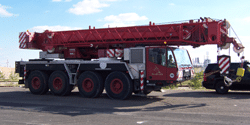
For self-propelled and trailer-mounted cranes, along with well-servicing units which exceed Texas size and weight limits, the Crane & Well Service Unit Mileage Permit allows for a single trip from Point A to Point B. While these permits are only valid for seven days, they are based on mileage, so a single permit allows you to go from a starting point, to a destination, and back to the starting point or another location.
8. Self-Propelled Off-Road Equipment

Another type of single-trip permit, the Self-Propelled Off-Road Equipment Permit allows you to drive off-road equipment on state highways directly from a point of origin to a destination. Note that this permit does not allow travel on controlled access highways, and you must have a $10,000 permit bond on file with the Texas DMV before permit approval.
9. Temporary Registration
There are four types of Temporary Vehicle Registration Permits: 72-hour, 144-hour, one-trip, and 30-day. However, you can only get a temporary registration permit under specific conditions, such as:
- The vehicle is not registered.
- The vehicle is registered in a state that does not have a reciprocity agreement with Texas.
- The vehicle is registered in a state that has a prorate agreement with Texas, but the vehicle does not have a prorate sticker or registration cab card for Texas.
- To increase weight, if the vehicle is not registered for its maximum allowable weight.
For each type of permit and condition, there are more details listed on the DMV’s temporary registration page. The easiest way to apply for one of these permits is either in person at your county tax office or a DMV Regional Service Center, or online through the Temporary Permits System.
10. 30/60/90 Day Width or Length
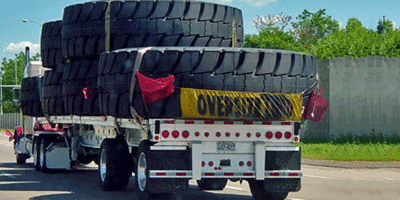
For non-divisible loads that need a certain time period for hauling, the 30-, 60-, or 90-Day Permits allow for movements within that certain time period. However, the width and length must be in conjunction with each other, so that vehicles and loads must follow these requirements:
· No greater than 13’ wide, 14’ high or legal length for an overwidth permit
· No greater than 8’6” wide, 14’ high, 110’ long for vehicles and loads on a trailer for an overlength permit
· No longer than 75’ long for single vehicles moving empty or hauling a load
11. Company Specific Envelope

Company Specific Envelopes are valid for one year and apply to companies transporting non-divisible loads that fall within these specific dimensions and weight:
· Not exceeding 12’ in width
· Not exceeding 14’ in height
· Not exceeding 110’ in length
· Not exceeding 120,000 lbs. in gross weight
This permit can be used to operate any registered truck owned or leased by the company, and a company can apply for more than one permit if they need to operate more than one vehicle.
12. Vehicle Specific Envelope
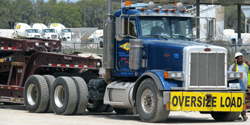
Like Company Specific Envelopes, Vehicle Specific Envelopes are valid for one year for non-divisible loads. The main difference between the two is that vehicle specific envelopes apply to each vehicle rather than the whole company. The same restrictions in width, height, length, and gross weight as Company Specific Envelopes also apply to Vehicle Specific Envelopes.
13. Fracing Trailer
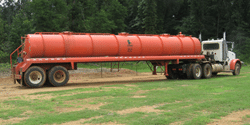
For truck-tractor and semitrailer combinations designed with a tank and pump unit, the Texas DMV offers an annual Fracing Trailer Permit. This permit can be used for vehicles which:
- Carry liquid oil well waste products or unrefined petroleum products from wells not connected to a pipeline and return empty
- Haul liquid products related to oil well production to an oil well and return empty
- Haul liquid products related to oil well production to an oil well and return with liquid waste products or unrefined liquid petroleum products from an oil well not connected to a pipeline
14. Hay
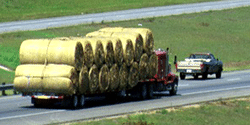
Hay Hauling Permits are valid for one year and allow vehicles to transport round bales of hay using side-by-side loading. The limit on side-by-side loading is 12’ wide, and all other dimensions must meet the legal limits.
15. Quarterly Hubometer

Quarterly Hubometer Permits are used for hubometer-equipped fixed-load machinery and cranes, with a limit of 91 days. Types of vehicles which are eligible for this permit include:
- Self-propelled oil well servicing units
- Self-propelled mobile cranes
- Self-propelled concrete pumps
- Trailer-mounted oil well servicing units
- Coiled tubing units
- Swabbing units
- Self-propelled bundle extractors
Keep in mind that there are limitations which vehicles with this permit may not exceed:
- 12’ in width
- 14’6” in height
- 95’ in length
· For maximum weight:
- 30,000 lbs. per axle based upon results of weight analysis
- 850 lbs. per inch of tire width for non-steerable units
- 950 lbs. per inch of tire width for steerable units
16. Implements of Husbandry

An Implements of Husbandry Annual Permit allows the transportation of farm implements, machinery, and tools; the transportation and spreading of fertilizer; and the delivery of feed to livestock. The following restrictions apply to oversize or overweight implements of husbandry:
- 16’ maximum in height
- 16’ maximum in width
- 110’ maximum in length
17. Manufactured Housing Annual
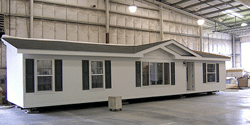
If you’re looking to transport new houses to a temporary storage location within a 20-mile radius, the Manufactured Housing Annual Permit is the right one for you. This permit is valid for one year and can be used by multiple vehicles.
18. Mobile Crane (Annual)

The annual Mobile Crane Permit is issued for cranes exceeding legal width and length limits, which may not exceed:
- 10’ in width
- The legal height limit (14’)
- The legal length limit (59’)
- Specific weight limitations depending on axle group
19. Well Servicing Unit (Annual)
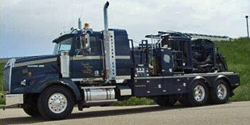
The annual Well Servicing Unit Permit allows the movement of oil well servicing units that do not exceed the legal size and weight limits and which are registered with a Texas “permit” plate.
20. Over Axle/Over Gross Weight Tolerance
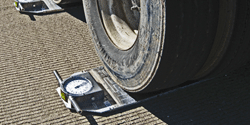
Another annual permit is the Over Axle/Over Gross Weight Tolerance Permit, which allows carriers to move divisible commodities up to 10% higher than the allowable axle weight and up to 5% higher than the allowable gross weight.
21. Rig-Up Truck
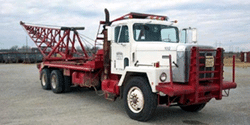
The Rig-Up Truck permit is valid for one year and allows trucks with a winch and gin poles to move on state-maintained roads. The following dimensions apply to this permit:
- May not exceed the legal height limit (14’)
- May not exceed the legal length limit (59’)
- For weight, the maximum is 25,000 lbs. or 850 lbs. per inch of tire width on the steer axle(s), whichever is less. All other axles must be lower than the legal weight limit.
22. Utility Pole

The annual Utility Pole Permit allows for the movement of poles required for electrical power transmission and line distribution. With this permit, night travel is allowed for emergencies. However, it only applies to vehicles which are up to 75’ long and meet all other Texas legal size and weight limits.
23. Water Well Drilling Machinery & Equipment
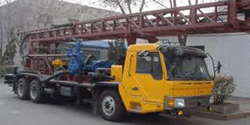
The Water Well Drilling Machinery & Equipment Permit allows for the movement of self-propelled or mounted machinery used for drilling water wells. This permit is valid for one year, and machinery operating under this permit must meet these requirements:
- 16’ or less in width
- 14’6” or less in height
- 110’ or less in length
- Legal weight requirement
- Only travel using the state highway system
24. Annual Timber Permit
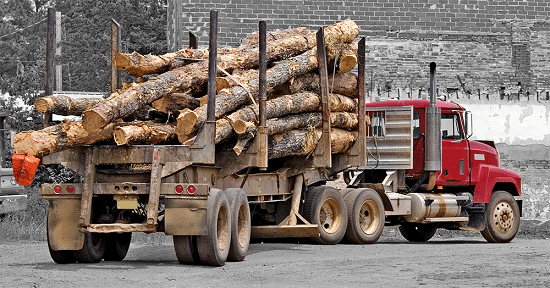
The Annual Timber Permit is used for transporting unrefined timber, wood chips, or woody biomass across state-maintained and county roads. At least two days before traveling under this permit, the carrier must notify the Texas Department of Transportation through their online form.
25. Ready-Mixed Concrete Trucks
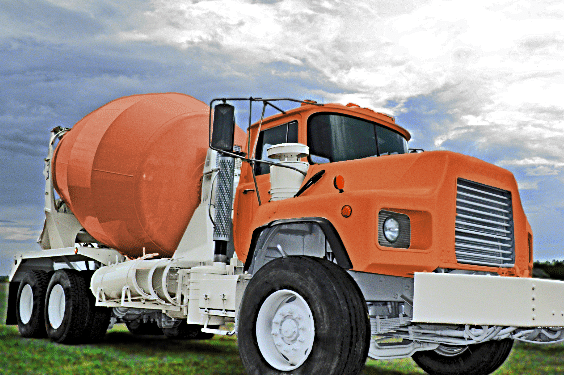
Ready-mixed concrete trucks operating on three axles and which do not exceed legal size limits are eligible for the annual Ready-Mixed Concrete Truck Permit. Trucks may, however, exceed the allowable axle weights by a tolerance of 10% as long as the gross weight is 69,000 lbs. or less.
26. Annual Length
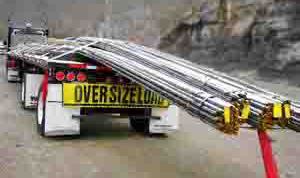
The Annual Length Permit is given to trucks with overlength loads that cannot be separated. The following restrictions apply:
· Must be less than or equal to 8’6” wide, 14’ high, and 110’ long for vehicles and loads on a trailer
· Must be no longer than 75’ long for single vehicles moving empty or hauling a load
27. Federal Disaster Relief

The Federal Disaster Relief Permit is available during national emergencies or major disasters declared by the U.S. President. Due to the nature of the permit, it expires 120 days after the President’s declaration and can only be used to:
· Assist in removing debris from roads and other locations
· Deliver relief supplies
If the haul must be taken outside of Texas, the carrier must check each individual state’s requirements to make sure they receive the proper entry permits.
28. North Texas Intermodal
Intermodal shipping containers are used to pack, ship, or transport cargo and can be taken or removed from other vehicles such as ships or freight trains. In order to get an annual Intermodal Permit that travels within five miles of the Texas/Arkansas border, the gross weight of the truck must not exceed 93,000 lbs.
29. Fluid Milk Transport
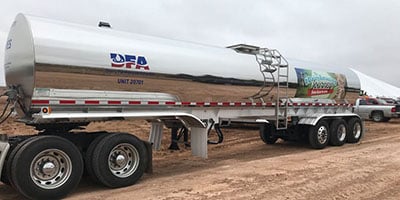
There are certain “dairy routes” approved by the Texas Department of Transportation that trucks can use after receiving a Fluid Milk Transport Permit. This permit is valid for one year, and the gross weight of the vehicle cannot exceed 90,000 lbs. There are also special requirements for axle distances and axle weight limits. Note that when you apply for this type of permit, you must select the routes you want to travel during the application process.

How do I apply for a permit?
Anyone interested in applying for an oversized load permit can apply online. Be aware that there is a $60 permit fee and a highway maintenance fee, and that all permit requests must be submitted 6 to 8 weeks before the permit is required.
What is Twisted Nail’s role in the heavy haul paperwork process?
At Twisted Nail, our professional dispatch team works closely with owner-operators and the Texas DMV to ensure you get the proper paperwork and permits. We can also connect you with a trucking company that is the perfect fit for you.
Hauling an oversized load without first gaining the proper paperwork and permits can result in expensive consequences. It’s important that you select the right heavy haul carrier for you in order to follow the regulations for your specific load. If you’re looking for some advice on hauling a heavy load, or if you need help finding a reputable carrier, give us a call today and we’ll be happy to help.